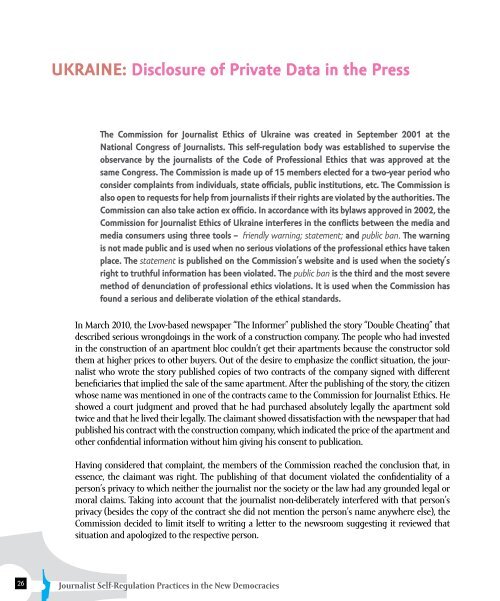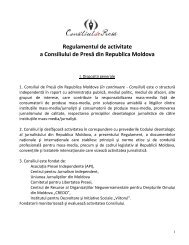Journalist Self-Regulation Practices in the New Democracies - Unesco
Journalist Self-Regulation Practices in the New Democracies - Unesco
Journalist Self-Regulation Practices in the New Democracies - Unesco
You also want an ePaper? Increase the reach of your titles
YUMPU automatically turns print PDFs into web optimized ePapers that Google loves.
Ukra<strong>in</strong>e: Disclosure of Private Data <strong>in</strong> <strong>the</strong> Press<br />
The Commission for <strong>Journalist</strong> Ethics of Ukra<strong>in</strong>e was created <strong>in</strong> September 2001 at <strong>the</strong><br />
National Congress of <strong>Journalist</strong>s. This self-regulation body was established to supervise <strong>the</strong><br />
observance by <strong>the</strong> journalists of <strong>the</strong> Code of Professional Ethics that was approved at <strong>the</strong><br />
same Congress. The Commission is made up of 15 members elected for a two-year period who<br />
consider compla<strong>in</strong>ts from <strong>in</strong>dividuals, state officials, public <strong>in</strong>stitutions, etc. The Commission is<br />
also open to requests for help from journalists if <strong>the</strong>ir rights are violated by <strong>the</strong> authorities. The<br />
Commission can also take action ex officio. In accordance with its bylaws approved <strong>in</strong> 2002, <strong>the</strong><br />
Commission for <strong>Journalist</strong> Ethics of Ukra<strong>in</strong>e <strong>in</strong>terferes <strong>in</strong> <strong>the</strong> conflicts between <strong>the</strong> media and<br />
media consumers us<strong>in</strong>g three tools – friendly warn<strong>in</strong>g; statement; and public ban. The warn<strong>in</strong>g<br />
is not made public and is used when no serious violations of <strong>the</strong> professional ethics have taken<br />
place. The statement is published on <strong>the</strong> Commission’s website and is used when <strong>the</strong> society’s<br />
right to truthful <strong>in</strong>formation has been violated. The public ban is <strong>the</strong> third and <strong>the</strong> most severe<br />
method of denunciation of professional ethics violations. It is used when <strong>the</strong> Commission has<br />
found a serious and deliberate violation of <strong>the</strong> ethical standards.<br />
In March 2010, <strong>the</strong> Lvov-based newspaper “The Informer” published <strong>the</strong> story “Double Cheat<strong>in</strong>g” that<br />
described serious wrongdo<strong>in</strong>gs <strong>in</strong> <strong>the</strong> work of a construction company. The people who had <strong>in</strong>vested<br />
<strong>in</strong> <strong>the</strong> construction of an apartment bloc couldn’t get <strong>the</strong>ir apartments because <strong>the</strong> constructor sold<br />
<strong>the</strong>m at higher prices to o<strong>the</strong>r buyers. Out of <strong>the</strong> desire to emphasize <strong>the</strong> conflict situation, <strong>the</strong> journalist<br />
who wrote <strong>the</strong> story published copies of two contracts of <strong>the</strong> company signed with different<br />
beneficiaries that implied <strong>the</strong> sale of <strong>the</strong> same apartment. After <strong>the</strong> publish<strong>in</strong>g of <strong>the</strong> story, <strong>the</strong> citizen<br />
whose name was mentioned <strong>in</strong> one of <strong>the</strong> contracts came to <strong>the</strong> Commission for <strong>Journalist</strong> Ethics. He<br />
showed a court judgment and proved that he had purchased absolutely legally <strong>the</strong> apartment sold<br />
twice and that he lived <strong>the</strong>ir legally. The claimant showed dissatisfaction with <strong>the</strong> newspaper that had<br />
published his contract with <strong>the</strong> construction company, which <strong>in</strong>dicated <strong>the</strong> price of <strong>the</strong> apartment and<br />
o<strong>the</strong>r confidential <strong>in</strong>formation without him giv<strong>in</strong>g his consent to publication.<br />
Hav<strong>in</strong>g considered that compla<strong>in</strong>t, <strong>the</strong> members of <strong>the</strong> Commission reached <strong>the</strong> conclusion that, <strong>in</strong><br />
essence, <strong>the</strong> claimant was right. The publish<strong>in</strong>g of that document violated <strong>the</strong> confidentiality of a<br />
person’s privacy to which nei<strong>the</strong>r <strong>the</strong> journalist nor <strong>the</strong> society or <strong>the</strong> law had any grounded legal or<br />
moral claims. Tak<strong>in</strong>g <strong>in</strong>to account that <strong>the</strong> journalist non-deliberately <strong>in</strong>terfered with that person’s<br />
privacy (besides <strong>the</strong> copy of <strong>the</strong> contract she did not mention <strong>the</strong> person’s name anywhere else), <strong>the</strong><br />
Commission decided to limit itself to writ<strong>in</strong>g a letter to <strong>the</strong> newsroom suggest<strong>in</strong>g it reviewed that<br />
situation and apologized to <strong>the</strong> respective person.<br />
26 <strong>Journalist</strong> <strong>Self</strong>-<strong>Regulation</strong> <strong>Practices</strong> <strong>in</strong> <strong>the</strong> <strong>New</strong> <strong>Democracies</strong>



